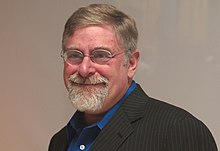David Ungar | |
|---|---|
 | |
| Other names | David Michael Ungar |
| Citizenship | American |
| Alma mater | U.C. Berkeley |
| Awards | ACM Fellow ACM Dissertation Award Dahl-Nygaard Prize |
| Scientific career | |
| Fields | Computer Science |
| Institutions | Stanford Sun Microsystems IBM Research |
| Thesis | The Design and Evaluation of a High-Performance Smalltalk System (1986) |
| Doctoral advisor | David A. Patterson |
David Michael Ungar, an American computer scientist, co-created the Self programming language with Randall Smith. The Self development environment's animated user experience was described in the paper Animation: From Cartoons to the User Interface co-written with Bay-Wei Chang, which won a lasting impact award at the ACM Symposium on User Interface Software and Technology 2004.
Ungar graduated as a doctor of philosophy in computer science from the University of California, Berkeley, in 1985. His doctoral advisor was David Patterson and his dissertation was entitled The Design and Evaluation of a High-Performance Smalltalk System; it won the 1986 ACM Doctoral Dissertation Award.
He was an assistant professor at Stanford University, Dept. of Electrical Engineering, Computer Systems Lab, where he taught programming languages and computer architecture, from 1985 to 1990. In 1991, he joined Sun Microsystems and became a distinguished engineer. In 2006 he was recognized as a Distinguished Engineer by the Association for Computing Machinery and in 2010 a Fellow.[1] From 2007 to 2017, he worked at IBM Research, where he was a member of the Dynamic Optimization Group, and investigated new paradigms including ensemble and subjective programming. From 2017 to 2022, he worked at Apple, where he sped up Swift language compilation. Currently retired, he builds apps for his personal use on various Apple platforms.
Ungar holds over 20 US patents.
In 2006 the 1987 Self paper, coauthored by Ungar and Randall B. Smith, was selected as one of the three most influential OOPSLA papers presented between 1986 and 1996.[2] Self was also one influence on the design of the JavaScript programming language.[3] Ungar's 1984 paper, Generation Scavenging: A Non-disruptive High Performance Storage Reclamation Algorithm, which introduced generational garbage collection, won a Retrospective ACM SIGSOFT Impact Paper Award in 2008.[4]
Dave Ungar was awarded the Dahl-Nygaard Senior Prize in 2009.[5]
- ^ "ACM Names 41 Fellows from World's Leading Institutions — Association for Computing Machinery". Archived from the original on 2012-04-28. Retrieved 2010-12-08.
- ^ ACM. "SIGPLAN - Awards".
- ^ Severance, C. (February 2012). "JavaScript: Designing a Language in 10 Days". Computer. 45 (2): 7–8. doi:10.1109/MC.2012.57. ISSN 0018-9162. S2CID 29215508.
- ^ ACM. "SIGSOFT Impact Paper Award". Archived from the original on 2010-07-15.
- ^ Association Internationale pour les Technologies Objets. "The AITO Dahl-Nygaard Prize Winner for 2009". Retrieved 2009-10-15.